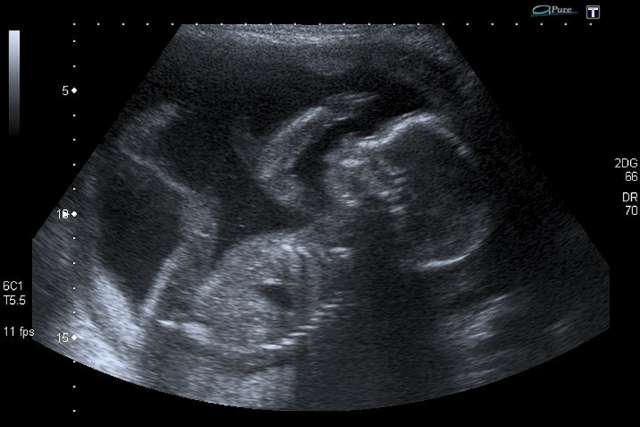– Micah Pickering was born prematurely at 20 weeks. His eyes were “fused shut,” according to his mother, and his bones were still soft. He spent four months in the neonatal intensive care unit.
Yet Micah survived against the odds, and is today a healthy 5 year-old attending Kindergarten.
“When I look at a little baby, a 20-week baby, my heart is full. I’ve been that mom standing there begging God and doctors to let this precious baby live,” his mother Danielle said on Tuesday.
“I’ve been that mom who would do anything to see that child take their first steps and say their first words, and to start school.”
Danielle Pickering spoke at a press conference on Tuesday at the U.S. Capitol, announcing that the Pain-Capable Unborn Child Protection Act will be voted on by the U.S. House on Oct. 3.
The bill, which has passed the House in previous sessions but has not passed the Senate, would ban abortions after 20 weeks of pregnancy except in cases of rape, incest, or when the life of the mother is deemed to be at stake.
Jeanne Mancini, president of March for Life, said the group “welcomes the announcement.”
“This bill would not only save 20,000 lives every year, but would educate the public on the humanity of the unborn person and affirm the science of fetal pain early in development,” she said.
Studies are showing that unborn children as early as 20 weeks old can feel pain, and that a small percentage, with the right treatment, can survive outside the womb. These signs of viability, pro-life leaders say, demand that at least the rights of these babies must be taken into account in the abortion debate.
According to a study in the New England Journal of Medicine, which was cited by the New York Times, a small number of babies observed who were born prematurely at 22 weeks gestation (or 20 weeks post-fertilization, as observed under the Pain-Capable bill) survived with few health issues.
When Micah was born prematurely, he couldn’t breathe, Danielle Pickering said, and she was told she couldn’t touch Micah’s skin. Yet “he was alive and he was fighting, and he wanted to live,” she said.
Micah “is the face of the pro-life movement,” Rep. Chris Smith (R-N.J.), chair of the House Pro-Life Caucus, stated on Tuesday.
“If not for the tremendous love and heroism of his parents, he could have been yet another victim of the abortion culture and the culture of denial that drives us as a nation to look askance.”
Another reason for the bill’s passage is that studies show unborn babies can feel pain around the age of 20 weeks, supporters of the bill said.
The Charlotte Lozier Institute, the research arm of the pro-life Susan B. Anthony List, documented the research showing that unborn babies can indeed feel pain at 20 weeks post-fertilization, as well as exhibit defensive responses during invasive procedures in the womb as early as six weeks post-fertilization.
One 2013 study which used the procedure “functional magnetic resonance” to study pain responses of unborn babies found that “functional neuronal connections” in their brains “sufficient to experience pain already exist by 22 weeks post-fertilization.”
Additionally, “there is extensive evidence of a hormonal stress response by unborn babies as early as 16 weeks post-fertilization,” according to one study, the institute found.
House Majority Leader Kevin McCarthy on Tuesday announced the bill would receive a vote. “Not only will passing this legislation keep a promise we made, but all the work is for the same goal – ending suffering, and helping people live,” he said.
It is expected to pass the House, which has in recent years already passed several significant pro-life bills including the defunding of Planned Parenthood and a bill that would set up additional protections against taxpayer funding of abortions.
President Donald Trump promised on the campaign trail to sign a Pain-Capable bill if one came to his desk, but the Senate has remained the chamber where the pro-life bills languish. Far fewer than 60 senators – enough votes to bring a bill to the floor for a vote – have consistent pro-life voting records.
This means that the 2018 mid-term elections could be critical, said Susan B. Anthony List president Marjorie Dannenfelser.
“We are preparing for 2018 Senate elections,” Dannenfelser told CNA on Tuesday. “If we come up short, which is likely, short of a Micah miracle, what we’re doing is we’re building that Senate up to a 60-vote margin.”
There was evidence of significant public support for a five month abortion ban in 2013, after the trial of notorious abortionist Kermit Gosnell in Philadelphia and three convictions for first-degree murder in the killing of babies born alive.
A more recent Quinnipiac University poll from January 2017 showed the public evenly split between supporting and opposing a ban on abortions after 20 weeks in the state they resided in.
Yet the bill is about more than public support, its supporters say. It is about protecting women and children from the evil of abortion.
“We want to be there for the woman, and we know that we need a law to protect the children,” Dannenfelser said on Tuesday.
“It is time that America recognizes and responds to the humanity” of unborn children, Rep. Trent Franks (R-Ariz.) said on Tuesday, “and the inhumanity of what is being done to them.”













